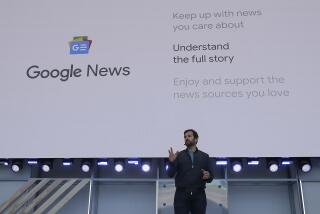Media Object to Firm’s Using Their Content
- Share via
There’s a fledgling San Diego company, GoSMS.com, that offers users a free service so they can get news articles and other information on their wireless-telephone screens.
Sounds cool, except for one problem: The “old-media” publishing empires that produce those articles claim that GoSMS.com is stealing from them, and they want the service stopped immediately.
The dispute sounds familiar, of course, because the recording industry is fighting in court to stop Internet site Napster Inc. from letting users download songs from other users’ databases.
And it’s a trend that’s only likely to keep growing, as other traditional providers of “content”--whether it be music or news stories or television broadcasts--face off against new technology’s effort to distribute that content to a wider audience.
Several media concerns recently joined to file suit against GoSMS.com for distributing their articles without their permission. GoSMS.com picks up the stories from the publishers’ own Web sites and ships the text to its users, the suit alleges.
“What we’re objecting to is their use of our content without permission; that is copyright infringement pure and simple,” said Bruce Keller, a New York lawyer representing the media firms.
The companies include New York Times Co., Washington Post Co., Gannett Inc. and the Cable News Network unit of Time Warner Inc. Their suit, filed in late June in U.S. District Court in New York, alleges that GoSMS.com is infringing their copyrights and trademarks, that the Web service is providing false advertising, and that GoSMS.com is unfairly competing against the publishers’ own Internet sites. (The Los Angeles Times and its parent, Tribune Co., are not among the plaintiffs.)
GoSMS was started a year ago by its chief executive, Yuval Golan, who had a similar operation in Israel. The service offers not only general news, but also sports results, entertainment, financial quotes and other information. The “SMS” in its name refers to the “short message service” delivery system that is limited to sending up to 160 letters and symbols at a time, according to the suit.
“If a subscriber wants, however, GoSMS.com purports to be able to send longer, ‘full story’ messages in batches of 160 characters,” the suit added.
Golan defended GoSMS, saying the company is “absolutely not” violating any copyrights. “We are justified to take information for limited-display devices, considering the limitations.” And “we are not taking money for the content” the service provides, he said.
Keller, the media firms’ lawyer, scored a victory earlier this year in a similar case. He represented the National Football League and the National Basketball Assn., which joined with some TV networks and movie studios to sue ICraveTV.com in Canada, which sent copyrighted sports games and other programs into the United States via streaming Internet technology. A federal judge stopped the service in February.
GoSMS.com’s news service is aimed mainly at wireless-phone customers whose phones are equipped with global system for mobile communication, or GSM, technology, that lets them both send and receive SMS messages.
And so far, GoSMS’ full service is available in California only to customers of Pacific Bell, a unit of SBC Communications Inc., because Pacific Bell is the only carrier with GSM capability, Golan said. But users of other devices, such as pagers, that can get e-mail also can get more-limited news or information from GoSMS.com.
Golan acknowledged that “we’re not making any money” yet and said he has no formal pact with Pacific Bell. For now, “I’m just a regular Pacific Bell customer” who pays the carrier “for each and every reply to everyone who uses the system,” he said.
A Pacific Bell spokesman, Steve Getzug, would say only that the carrier’s wireless division “has no relationship or agreement” with GoSMS. Pacific Bell is not involved in the lawsuit.
Eventually GoSMS would like to sign a deal with a carrier and start generating income, “once the system is proven that it can work commercially,” Golan said.
More to Read
Inside the business of entertainment
The Wide Shot brings you news, analysis and insights on everything from streaming wars to production — and what it all means for the future.
You may occasionally receive promotional content from the Los Angeles Times.











